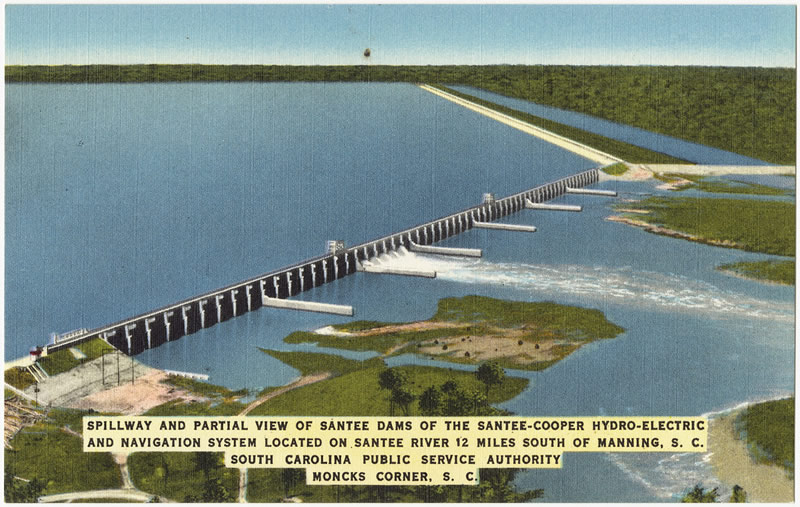
By Lindsay Street, Statehouse correspondent | The General Assembly might have a clearer pathway next week for dealing with Santee Cooper after almost two years of headaches following a $9 billion debacle over construction of two new nuclear reactors.
Lawmakers are seeking a way to accept binding bids for Santee Cooper on everything from selling the utility to getting a private utility to run it. Even if lawmakers approve a plan to take bids on various options, they’ll still need another General Assembly vote to decide Santee Cooper’s future.
As early as Monday morning, six lawmakers tapped for a conference committee could decide on key differences on a bill outlining bid evaluations. Differences include whether the bidding process should have a deadline, whether they should allow bids to include ownership of two lakes in the Lowcountry and whether the process will be overseen by a Virginia-based consultant who oversaw initial bids last year and part of this year.
Senate Majority Leader Shane Massey, R-Edgefield, told Statehouse Report Thursday that he expects the differences to be resolved Monday, despite it taking “a lot of work.” S.C. Rep. Russell Ott, D-Calhoun, called an initial conference meeting Thursday “productive” and said he also expected the conference committee to come to an agreement next week. Santee Cooper conference committee members include: Ott, Massey, House Ways and Means Chairman Murrell Smith, R-Sumter, House Speaker Jay Lucas of Hartsville, Senate Minority Leader Nikki Setzler of Lexington, and Senate Judiciary Chair Luke Rankin of Horry.
An agreement will then be voted on in a special session, which is slated to begin noon Monday. The session has been called to iron out differences between some House and Senate bills. Key among those next week will be the Santee Cooper bill, the budget and an incentives package to lure the NFL’s Carolina Panthers to South Carolina
Background
 Santee Cooper, which has nearly 1 million electric meters throughout the state between direct-serve customers and those served through electric cooperatives, became ensnared in controversy for its minority role in a scuttled nuclear reactor project in 2017. The public utility pulled the plug on its 45 percent share in the project, which racked up $9 billion in debt and was never completed. The majority-owning private company, South Carolina Electric and Gas, was sold to Dominion Energy in the fallout.
Santee Cooper, which has nearly 1 million electric meters throughout the state between direct-serve customers and those served through electric cooperatives, became ensnared in controversy for its minority role in a scuttled nuclear reactor project in 2017. The public utility pulled the plug on its 45 percent share in the project, which racked up $9 billion in debt and was never completed. The majority-owning private company, South Carolina Electric and Gas, was sold to Dominion Energy in the fallout.
Now, lawmakers are in their second year of mulling privatization. In 2018, a joint committee was established to evaluate preliminary bids. Seven non-binding purchase offers and eight other offers that looked at partial acquisition or management of the utility were made to lawmaker-hired ICF, a global consulting services firm that works with clients to manage big problems.

S.C. Sen. Larry Grooms, the Berkeley County Republican who represents Santee Cooper’s district and has been opposed to the bidding process, said the lawmaker-led evaluations of the utility are not set up to determine its worth but to ultimately execute its sale. He also said there is a lot of misinformation about the utility that make it seem inefficient.
“One of the reasons this is complicated is that in the history of the United States, no state has sold an asset as large as Santee Cooper,” Grooms said in April on the Senate floor. “There is no precedent for something this large.”
Those pushing the bid evaluation system counter that it’s only to entertain binding offers from potential buyers — and won’t lock the state into any sale that the General Assembly doesn’t approve.
“Anyone that has already come to that conclusion (to sell or not) is acting very prematurely. I don’t think anyone should have the opinion that we should sell or that we shouldn’t sell,” Ott said. “We don’t have enough information yet.”
Santee Cooper and the budget
The House and Senate passed differing versions of H. 4287, a bill to deal with Santee Cooper’s challenges, before the end of regular session. The bill is currently in conference committee through which three members of the House and three members of the Senate are working for a compromise on differences. The conference committee will meet Monday prior to a special session slated for next week. And conference agreement will then need to be voted on by the General Assembly.
Members of the budget conference include: Senate Finance Chair Hugh Leatherman of Florence, House Ways and Means Chair Smith, House Majority Leader Gary Simrill of York, House Minority Leader Todd Rutherford, D-Richland, and Sens. Sean Bennett, R-Dorchester, and Darrell Jackson, D-Richland.
The House version of the budget also includes a proviso that directs an evaluation process for privatization or management of Santee Cooper, making the two conference efforts linked. The House would likely have to remove its proviso from the budget to agree with the Senate — a move they may be reticent to make without an agreement on Santee Cooper in the other committee, Grooms said.
Some senators, like Grooms, are speculating that the House could delay passing a compromise on the state budget next week until the question of Santee Cooper is resolved. Should House members hold out on the budget, it could delay the special session until Tuesday.

But Ott said he doubted House Ways and Means Chairman Murrell Smith, R-Sumter, and House Speaker Jay Lucas of Hartsville, both of whom did not return inquiries, would hold the budget “hostage” over a Santee Cooper deal. He said House members are committed to passing the budget.
Rutherford said no one has said anything to him about not signing off on the budget until the Santee Cooper question is resolved.
Unclear on utility’s worth
Santee Cooper reports about $2 billion in annual revenues from its electricity generation and transmission. It has about $7 billion of debt, about half of which is tied to the defunct V.C. Summer nuclear project. ICF estimated the utility’s worth to be between $8.1 to $10.1 billion, which some say would be a deal for large utilities looking to gain a large number of meters in a growing market like South Carolina.
Supporters say the utility is plenty nimble and efficient. Documents from the utility show that it paid the state $17.5 million this year, and had $850 million in cash on hand as of March 30.
“I’m asking them what problems are you trying to solve? Santee Cooper has the lowest rates in the state … the strongest environmental record in the state, the strongest safety record … and in terms of economic development they can’t be touched,” Grooms said.
Those encouraging the bidding process say the utility is a debt-laden dinosaur that can no longer offer the best rates for customers in the state. And if the right bid doesn’t come in?
“You can always keep Santee Cooper, restructure it and make some changes,” Charleston Republican Sen. Paul Campbell said.
Presbyterian College Professor of Economics and Business Administration Jody Lipford said understanding the market-worth of Santee Cooper is difficult.
“You don’t have this concrete market valuation for the company and that could mean it’s more subject to interpretation,” Lipford said. “It makes the whole thing more gray and not black and white.”
As for selling the utility, the decision also isn’t black and white.
“This is not strictly an economic decision; this is also a political decision,” Lipford said. “(Lawmakers) have constituents they have to think about.”
- Have a comment? Send to: feedback@statehousereport.com



It would be nice if anyone ever defined what their interpretation of “Santee Cooper” is. Is it just the power company with its distribution network , “meters,” and office buildings, plus its share of VC Summer? What about the lands surrounding the lakes? Those include parcels that DNR manages and the Federal Wildlife Refuge at Santee. Who is going to keep those safe from development? Few members of the General Assembly or the general public seem to be aware of what’s at risk, but I’m certain that someone in all this is hoping to make a land grab.